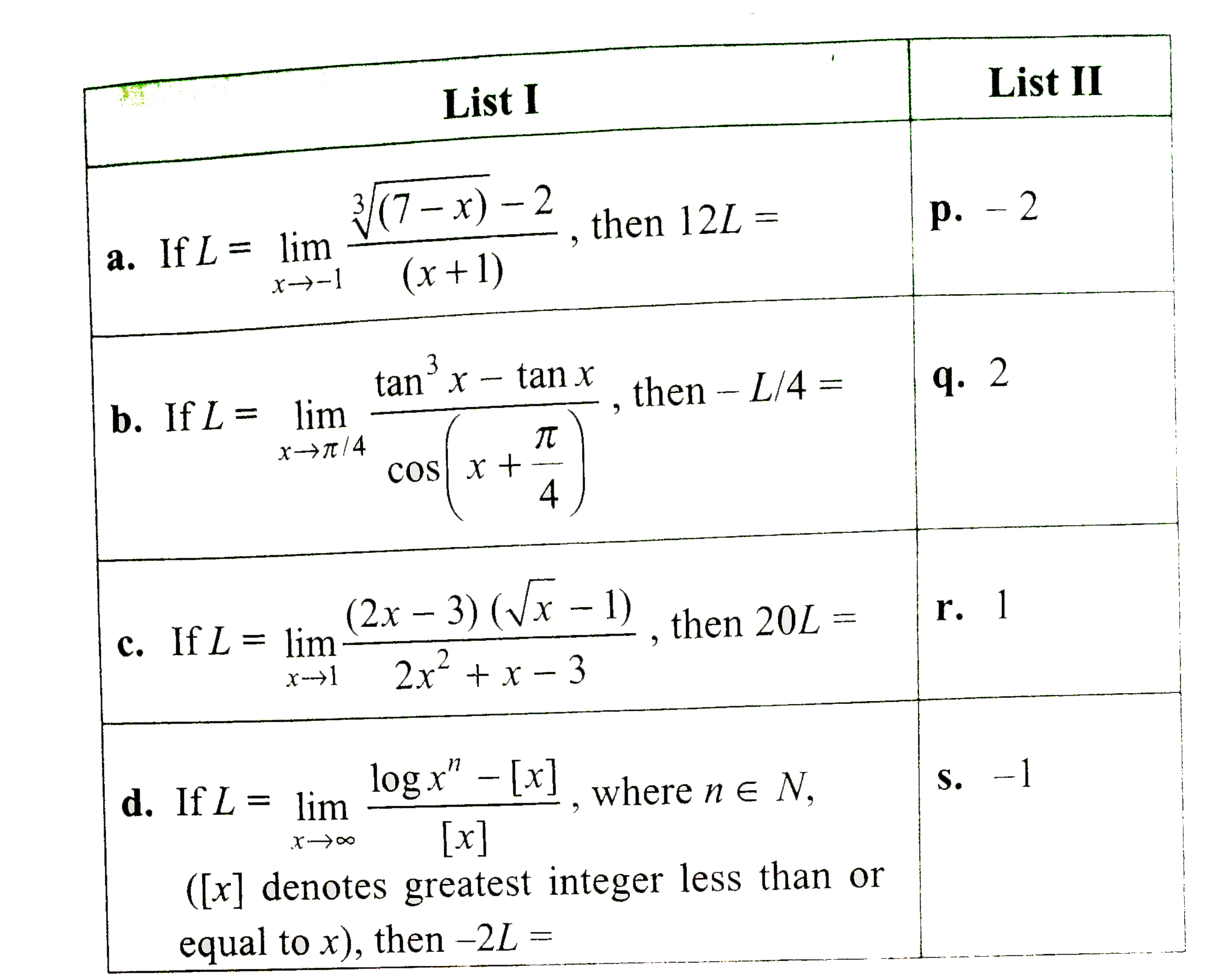, where denotes the fractional part of x.
is equal to Solution in Bengali
The correct Answer is:A
We have
In second limit, put Then
and
Topper's Solved these Questions
- LIMITSBOOK - CENGAGE PUBLICATIONCHAPTER - LIMITSEXERCISE - Matrix Match Type
5 Videos
- LIMITSBOOK - CENGAGE PUBLICATIONCHAPTER - LIMITSEXERCISE - Numerical Value Type
26 Videos
- LIMITSBOOK - CENGAGE PUBLICATIONCHAPTER - LIMITSEXERCISE - Exercises (Single Correct Answer Type)
76 Videos
- JEE 2019BOOK - CENGAGE PUBLICATIONCHAPTER - JEE 2019EXERCISE - Chapter 10
8 Videos
- LINEAR COMBINATION OF VECTORS, DEPENDENT AND INDEPENDENT VECTORSBOOK - CENGAGE PUBLICATIONCHAPTER - LINEAR COMBINATION OF VECTORS, DEPENDENT AND INDEPENDENT VECTORSEXERCISE - DPP 1.2
10 Videos
Similar Questions
Match the following lists:

View SolutionThe reciprocal of the value of: limn→∞(1−122)(1−132)(1−142)(1−1n2)is
View Solutionlimx→0[sin(sgn(x))(sgn(x))], where [.] denotes the greatest integer function, is equal to
View SolutionIf y = y(x) is the solution of the differential equation, xdydx+2y=x2 satisfying y(1) = 1, then y(12) is equal to
View SolutionThe number of integral values of p for which (p+1)ˆi−3ˆj+pˆk,pˆi+(p+1)ˆj−3ˆk and −3ˆi+pˆj+(p+1)ˆk are linearly dependent vectors is q
View SolutionConsider the function f(x)=(cos^(-1)(1-{x}))/(sqrt(2){x}); where {.} denotes the fractional part function,then
View SolutionDomain of f(x)=(1)/(sqrt({x+1}-x^(2)+2x)) where {} denotes fractional part of x.
View Solutionlet f(x)=(cos^(-1)(1-{x})sin^(-1)(1-{x}))/(sqrt(2{x}(1-{x}))) where {x} denotes the fractional part of x then
View SolutionIf f(x) = ex, then limx→0(f(x))1{f(x)} (where { } denotes the fractional part of x) is equal to -
View Solution(lim)x→11√|x|−{−x}(where{x} denotes the fractional part of (x) is equal to does not exist (b) 1 ∞ (d) 12
View SolutionLetf(x)=sin−1(1−{x})×cos−1(1−{x})√2{x}×(1−{x}), where {x} denotes the fractional part of x.
L=limx→0−f(x) is equal to
View SolutionLet f(x)=[x]+√{x}, where [.] denotes the integral part of x and {x} denotes the fractional part of x. Then f−1(x) is
View SolutionThe value of limx→0(tan({x}−1))sin{x}{x}({x}−1) is where {x} denotes the fractional part function
View SolutionLet f(x)={π2−sin−1(1−{x}2).sin−1(1−{x})√2({x}+{x}3),x≠0, where {.} is fractional part of x, then
View Solutionlimx→−11√|x|−{−x} (where {x} denotes the fractional part of x) is equal to
View SolutionLetf(x)=sin−1(1−{x})×cos−1(1−{x})√2{x}×(1−{x}), where {x} denotes the fractional part of x.
R=limx→0+f(x) is equal to
View Solution
